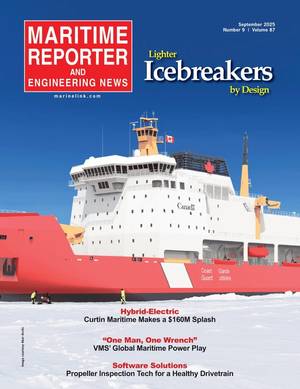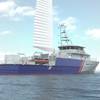From NSWC Dahlgren Division Public Affairs
Shaping the Navy for the future was the theme of a
recent
all hands call at Naval Surface Warfare Center Dahlgren Division in
which
the Commander, Naval Sea Systems Command (NAVSEA) praised the
accomplishments of the division's workforce supporting Operation Iraqi
Freedom and the War on Terrorism.
"I am keenly aware of your contributions," said Vice Adm. Phillip
Balisle to
more than 1,000 Dahlgren Division employees. "I have seen them as your
systems command commander. But, much more importantly, I have been your
customer for 33 years. I've sailed the ships that you have built,
developed
and maintained, and I have benefited from the Sailors you've
influenced."
Much of his focus was on the recent success of Operation Iraqi Freedom.
"On many days more than 70 percent of our naval forces were deployed,"
he
said. "They were mobilized on the shortest of notices and it left the
world
in total amazement about America's resolve. A lot of the people who
made
that kind of resolve possible are sitting right before me."
In plain-spoken language, Balisle said the nation's current Global War
on
Terrorism is forcing specific and fundamental change of Navy
infrastructure,
much of which will affect the workers of Dahlgren.
"Fundamental change is change that truly alters how you do business in a
major way that will be irrevocable," he said.
He explained that the change is promulgated by current events. In the
past,
especially during the Cold War, the Navy knew just about everything it
had
to know about a battle group, what it needed and when and where it would
be
at all times. In addition, the Navy also knew a lot about the enemy and
what
threats our nation faced from it.
"But look at today," he said. "We're in another war, with a very
different
enemy. We don't know when we will meet him or the terms under which we
will
meet him. Our job is to reshape the naval infrastructure to meet him."
Balisle also pointed to Operation Iraqi Freedom to illustrate his point
about the changing face of warfare. He said that we saw for the first
time
the shape that war will take in the 21st Century.
"I believe a Russian general said it best (about Operation Iraqi
Freedom):
'The Americans have rewritten the textbook on war and it has changed
forever.'"
Balisle said in World War II America built 15 ships a week and 300
planes a
day at its peak, and that the war was won by coupling America's
industrial
output to the men and women who go in harm's way to fight. The United
States won the Cold War the same way, he said, by out-producing what our
adversary could bring to the table.
"But look at this current enemy," Balisle continued. "He doesn't build
anything. He buys his weapons from the commercial marketplace and his
test
and evaluation of them is when he uses them on us."
The key to shaping the future Navy, Balisle said, is Sea Power 21. An
important component of that strategy in which NAVSEA will play a major
role
is Sea Enterprise, streamlining processes and finding efficiencies to
shape
a more effective naval force. Part of Sea Enterprise is the realignment
of
NAVSEA, the naval shipyards and warfare centers.
Balisle also fielded questions from his audience. The questions ranged
from
more frequent use of contractors to get jobs done at Dahlgren to the
Base
Realignment and Closure (BRAC) issues now facing Congress.
"In all BRAC issues, there can be only one winner and that is the United
States of America," Balisle said. "We need to make our facilities as
good
as they can be through realignments and subsequently eliminate our
redundancies so that when the BRAC people come they see our best."
Source: NAVSEA
Sponsored Content
Built for Battle. Proven by Shipbuilders.

Meet The New Standard in Underwater Connectivity

Featured videos

Inside the Hybrid Ferry Harbor Charger

WCI Fights for Efficient, Effective Inland Waterway Infrastructure Funding
September 2025
 Read the Magazine
Read the Magazine

 Read the Magazine
Read the Magazine
This issue sponsored by:

“One Man, One Wrench” Launched a Global Maritime Power Play
Subscribe for
Maritime Reporter E-News
Maritime Reporter E-News is the maritime industry's largest circulation and most authoritative ENews Service, delivered to your Email five times per week









